Scottish writer and actress Fiona Geddes tackles the difficult subject of schizophrenia in her play Normal/Madness, which visits Inverness and Aberdeen next month
HI FIONA, CAN YOU TELL US A BIT ABOUT YOUR BACKGROUND?
I was born in Aberdeen and brought up in the Moray area. We moved to Forres when I was 12 years old and I went to Forres Academy, graduating in 1999.
WHAT INSPIRED YOU TO BECOME A WRITER/ACTRESS?
When I was little, we owned the caravan park in Hopeman, which is situated on the site of the old railway station. When I was around four or five years old, I used to put on plays for the holiday-makers with a group of friends, using the platform as a stage. So I guess it was kind of inbuilt! I can’t remember ever wanting to do anything else. After school, I moved to London to do a BA in Acting at East 15 Acting School.
Since then I’ve been working as an actress on both stage and screen. I’ve had a fantastic time working on productions such as Five Daughters for the BBC and doing Shakespeare in Covent Garden, however I’d always wanted to do a show at the Edinburgh Festival and when Jessica Beck, who directed Normal/Madness, suggested I write my own show, I thought… yeah, why not.
YOU ARE TAKING YOUR PLAY NORMAL/MADNESS TO INVERNESS AND ABERDEEN. WHAT’S IT ABOUT?
The play explores the complex interplay of a parent-child relationship. The main character, Kirsty, is struggling with the conflict of responsibility to family and the desire to be an independent person. Having grown up caring for her mother, who has schizophrenia, it’s not until Kirsty leaves home that she realises her situation isn’t necessarily “normal”.
WHAT SORT OF RESEARCH DID YOU HAVE TO UNDERTAKE?
My own experience of caring for a relative with schizo-affecitve disorder provided the source material. I then interviewed a range of specialists – from psychiatrists to neuroscientists – as well as people who live with schizophrenia and family members who act as carers. All of whom very kindly shared their stories and experience with me.
HOW DIFFICULT WAS IT TO WRITE ABOUT A SUBJECT
CLOSE TO YOUR HEART?
It was tough. Just deciding to write the play was a hard decision to make. I was torn. I had a responsibility to protect my relative who was so fearful of the stigma that surrounds schizophrenia she couldn’t even face, let alone discuss, her own diagnosis. However, I knew that the only way to break that stigma is by sharing stories and experiences. Preoccupied with this dilemma, I failed to consider how challenging and emotional this journey would be for me personally. And it’s a good job I didn’t otherwise Normal/Madness may not have been written. And the positive impact this play has had on my life and relationships has been immeasurable. Not just for me, but for others. I’ve received letters of thanks from audience members expressing their gratitude for telling this story.
WHAT DO YOU HOPE THE AUDIENCE WILL GET FROM THE PLAY?
Our theatre company motto is “to inspire laughter, tears and new ideas” – and you get all three from Normal/Madness. Mental illness is of course a serious subject matter, and often heart-breaking, however we wouldn’t be able to get through it without some humour. It’s certainly how I cope. Audience response has been fantastic. People have related to the play in many ways, wether it’s through direct experience of mental illness, having to care for their parent as they get older, or simply the trials and tribulations of a mother-daughter relationship.
WHERE CAN WE SEE THE PLAY?
It comes to Eden Court, Inverness, on Tuesday, May 5, with a performance at 8pm, and The Lemon Tree, Aberdeen, on Thursday, May 7, with a performance at 7pm.
Contact: www.kidder.org.uk/normalmadness
